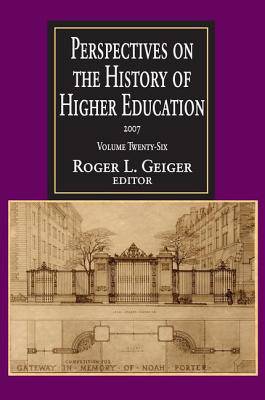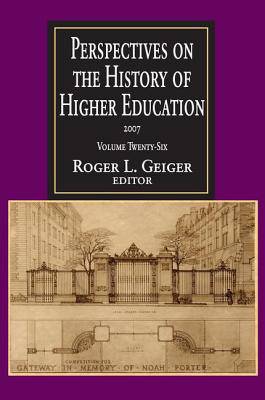
Bedankt voor het vertrouwen het afgelopen jaar! Om jou te bedanken bieden we GRATIS verzending (in België) aan op alles gedurende de hele maand januari.
- Afhalen na 1 uur in een winkel met voorraad
- In januari gratis thuislevering in België
- Ruim aanbod met 7 miljoen producten
Bedankt voor het vertrouwen het afgelopen jaar! Om jou te bedanken bieden we GRATIS verzending (in België) aan op alles gedurende de hele maand januari.
- Afhalen na 1 uur in een winkel met voorraad
- In januari gratis thuislevering in België
- Ruim aanbod met 7 miljoen producten
Zoeken
Perspectives on the History of Higher Education
Volume 26, 2007
Hardcover | Engels
€ 290,45
+ 580 punten
Omschrijving
This volume of Perspectives opens with two contrasting perspectives on the purpose of higher education at the dawning of the university age--perspectives that continue to define the debate today. First A. J. Angulo recreates the controversy surrounding the founding and early years of the Massachusetts Institute of Technology. Whether presented as an alternative to or a repudiation of the prevailing classical liberal education, MIT was rejected as inherently inferior by college defenders. Second is George Levesque's penetrating reappraisal of Yale president Noah Porter (1870-1886). Known almost solely for his role as a college defender, Porter is revealed as a vigorous scholar who became fixated with preserving the strengths of Yale College. As these matters were vigorously debated during these years, Porter's position was superseded by more powerful forces.Considering the cliches about liberal domination of higher education, it is seldom appreciated that the conservative movement has had a presence on campus throughout the postwar era. Jennifer de Forrest uses the reorganization of several conservative foundations to offer a critical appraisal of their impact. Known as the "four sisters," the Bradley Foundation, the Scaife Foundations, the Smith Richardson Foundation, and the Olin Foundation have been sharply focused on winning student support by funding conservative scholars and networking organizations, as well as student groups and newspapers.The tempestuous state of academic publishing is made more vivid by the clash of colorful characters. At the dawn of modern academic publishing, the Educational Review, published by Columbia's Nicholas Murray Butler, was the foremost journal in its field. Paul McInerny interweaves the history of this journal with the educational issues of the late nineteenth century and the remarkable career of Columbia's longtime president. An additional actor is James McKeen Cattell, a noted psychologist and prolific academic publisher. As a Columbia professor, Cattell was also a thorn in the side of President Butler. In 1917 Butler fired Cattell for criticizing the war effort, an egregious breach of academic freedom even for those early times. Events took an ironic turn, however, when Cattell later acquired Butler's former Review.
Specificaties
Betrokkenen
- Uitgeverij:
Inhoud
- Aantal bladzijden:
- 174
- Taal:
- Engels
Eigenschappen
- Productcode (EAN):
- 9781138529779
- Verschijningsdatum:
- 14/09/2017
- Uitvoering:
- Hardcover
- Formaat:
- Genaaid
- Afmetingen:
- 152 mm x 229 mm
- Gewicht:
- 403 g

Alleen bij Standaard Boekhandel
+ 580 punten op je klantenkaart van Standaard Boekhandel
Beoordelingen
We publiceren alleen reviews die voldoen aan de voorwaarden voor reviews. Bekijk onze voorwaarden voor reviews.








